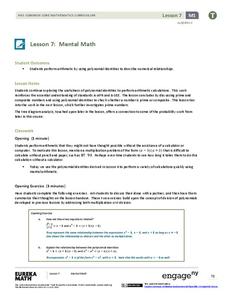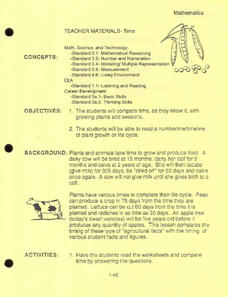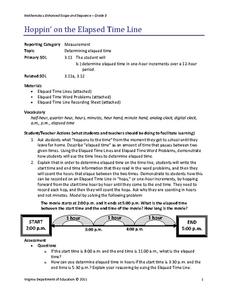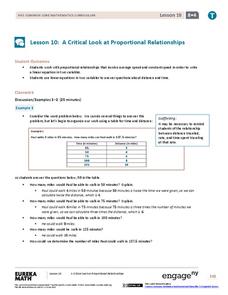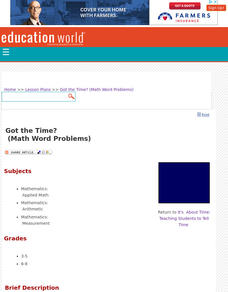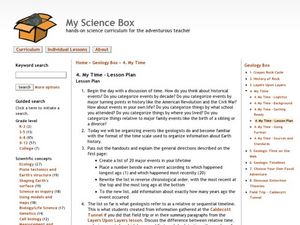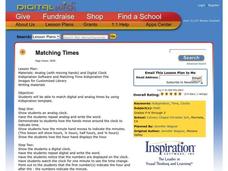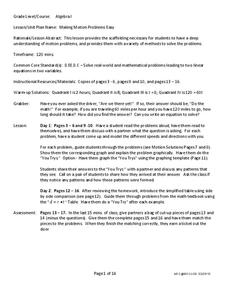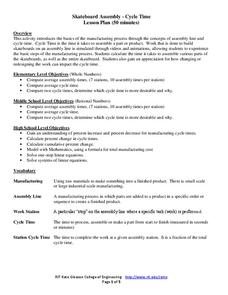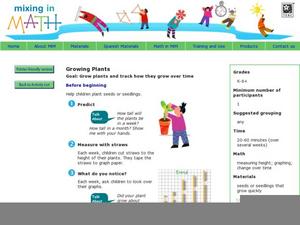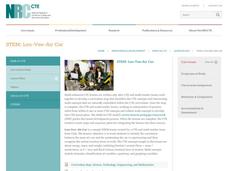Curated OER
Keep Track of time by watching the clock
Students answer questions about the clock. In this time lesson, students answer questions using intervals of five minutes. Students solve problems about how long to the next activity, how much longer, and whether or not we have...
EngageNY
Mental Math
Faster than a speedy calculator! Show your classes how to use polynomial identities to multiply numbers quickly using mental math.
Curated OER
Time
An interesting lesson focuses the growth cycles of plants and animals. Learners look at plants like radishes, peas, and apples, and compare their growth cycles to those of dairy cows. Some very good worksheets are included in this plan...
Curated OER
Right on Time
The hour is nigh for your class to practice equivalency problems in the form of time-zone conversions. They write equations to describe elapsed time and apply problem solving strategies, including writing a plan, to solve the problems.
Curated OER
Telling Time Bingo
Have your youngsters examine the difference between digital and analog clocks. Using They participate in a "Telling Time BINGO" game. Not only is this activity fun, but it provides the teacher with an opportunity to informally assess his...
Curated OER
Time Around the World
Seventh graders investigate the characteristics of a time zone map. They read and interpret time zone maps. Students compare the time in various time zones. Students solve time zone problems.
Curated OER
Math for the Frontier
Make history come to life by using the Frontier House series to engage young scholars in the past. Your class will "prepare" for a trip to 1833 Montana. They will learn about homesteading, frontier life, inflation, and cost of living....
Curated OER
Winter-time Temps
Students measure temperature and become aware the the temperature above and below the snow is different. In this winter temperature lesson, students measure temperatures to find variation based on how the snow is packed. Students...
Virginia Department of Education
Hoppin' on the Elapsed Time Line
Time flies when you're teaching math! Okay, maybe not for everyone, but this activity will have your young mathematicians calculating elapsed time before you know it.
EngageNY
A Critical Look at Proportional Relationships
Use proportions to determine the travel distance in a given amount of time. The 10th installment in a series of 33 uses tables and descriptions to determine a person's constant speed. Using the constant speed, pupils write a linear...
Education World
Got the Time? (Math Word Problems)
Upper graders work with peers to solve word problems related to time and independently solve word problems that involve calculating time. They will show their ability to solve and work through mathematical operations. A worksheet is...
Alabama Learning Exchange
Time to Tell Time
Young scholars demonstrate how to tell time using an analog clock. In this time measurement lesson, students read the book Clocks and More Clocks and use analog clocks to demonstrate the time that the teacher called out.
Curated OER
My Time!
Learners explore how to tell time by looking at their daily schedule. Everyone's days start out the same (with school), but what does each learner do after school? How do they spend their time?
Curated OER
Matching Times
Study digital and analog times on a clock with learners. They will use the Kidspiration template to create a digital and analog time display on the computer. They also display the correct times on both analog and digital clocks when the...
Curated OER
Time Travel
Elementary schoolers practice measuring elapsed time between events. Learners work together to complete a worksheet, embedded in the plan, on elapsed time. The puzzle they must solve takes some time to complete. One of the tasks each...
Curated OER
Math: Navigating the World Around Me
Young mathematicians research and discuss real world math word problems and ways in which they apply math concepts in their everyday lives. They create a storyboard of a math word problem from which they create a slide for a multi-media...
West Contra Costa Unified School District
Motion Problems
Let's hope class participants don't get motion sickness. In the lesson, class members first solve motion problems using tables and graphs. They then use algebraic techniques to solve motion problems.
Federal Reserve Bank
Financial Fables: Shopping Wisely with Olivia Owl
Cover two subjects with one lesson! First, dive into English language arts; read an eBook, answer comprehension questions, and complete a cause and effect chart about the financial fable, Shopping Wisely with Olivia Owl. Then, take...
K20 LEARN
Prime Time
How many prime numbers are there between 1 and 100? By using a prime time resource, your scholars should be able to answer this question. Using arrays, they determine if numbers are prime or composite, and then write a prime...
Curated OER
Just a Minute!
Students put the standard measure of clock time -- the minute -- in perspective. This lesson can be modified for virtually any grade level. They write about what they learned about a minute as a result of the activities.
Rochester Institute of Technology
Skateboard Assembly - Cycle Time
Assemble a great lesson on assembly lines. In the first installment of a nine-part technology/engineering series, future entrepreneurs learn about the manufacturing process, specifically about the assembly line and cycle time. The lesson...
EngageNY
Arcs and Chords
You've investigated relationships between chords, radii, and diameters—now it's time for arcs. Learners investigate relationships between arcs and chords. Learners then prove that congruent chords have congruent arcs, congruent arcs have...
Mixing In Math
Mixing in Math: Growing Plants
Whether you have your class plant seeds or begin when sprouts are visible, math skills are used here to predict and track growth over time. Straw bar graphs show plant height on a given day while the graph as a whole shows changes over...
National Research Center for Career and Technical Education
STEM: Lou-Vee Air Car
A comprehensive lesson plan on acceleration awaits your physicists and engineers! Two YouTube videos pique their interest, then sample F=ma problems are worked and graphed. The highlight of the lesson plan is the building of a Lou-Vee...



